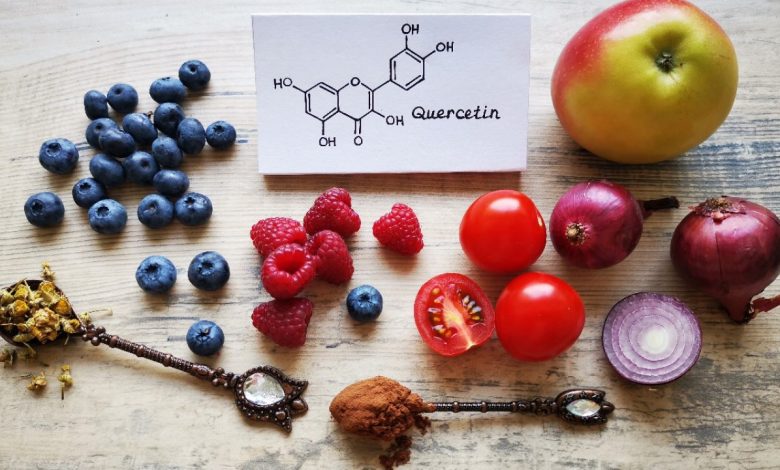Quercetin: A Simple Key to Longevity?

In the never-ending quest to prolong human life and mitigate the inevitable effects of ageing, science has continuously searched for innovative solutions. Among the myriad compounds that have attracted attention in this quest, quercetin, a naturally occurring flavonoid found in various plants and foods, has emerged as a subject of great interest.
The Potential Benefits of Quercetin
As we explore the potential benefits of quercetin in our journey to unlock the secrets of longevity and senescent cell management, it’s important to look at the specific benefits this natural compound can offer. In this section, we’ll discuss the many potential benefits of adding a quercetin supplement to your daily regimen.
Lifespan Extension
One of the most intriguing aspects of quercetin supplementation is its potential to extend lifespan. Recent studies have shown that quercetin can increase the longevity of various organisms, including mice and worms.
For example, in a study published in Nature Communications, researchers found that quercetin supplementation significantly increased the lifespan of mice by activating specific pathways associated with longevity.
This discovery not only highlights quercetin’s potential as a life-extending compound, but also raises hopes for its use in promoting healthy ageing in humans.
Cellular Rejuvenation
Quercetin’s effect on cellular rejuvenation cannot be overstated. It has the ability to rejuvenate senescent cells, which are cells that have stopped dividing and functioning properly, contributing to ageing and age-related diseases. Research has shown that quercetin can stimulate the removal of senescent cells through a process known as apoptosis.
By eliminating these dysfunctional cells, quercetin promotes tissue regeneration and cellular overall health. This effect has significant implications for age-related conditions such as osteoarthritis, as the removal of senescent cells can potentially alleviate age-related degenerative diseases.
Anti-Inflammatory Effects
Chronic inflammation is a hallmark of ageing and has been implicated in the development of several age-related diseases, from cardiovascular disease to neurodegenerative disorders. Quercetin has been shown to have potent anti-inflammatory properties that can help combat the damaging effects of chronic inflammation.
It does this by inhibiting the production of pro-inflammatory molecules such as cytokines and chemokines. Studies have shown that quercetin supplementation can effectively reduce markers of inflammation in the body. For example, a study published in the Journal of Nutritional Biochemistry found that quercetin supplementation significantly reduced inflammatory markers in people with metabolic syndrome.
This anti-inflammatory effect holds promise not only for improving overall health, but also for potentially delaying the onset of age-related diseases.
4 Practical Applications and Recommendations
Harnessing the potential of quercetin to increase longevity and target senescent cells involves several practical applications and recommendations.
These strategies can be incorporated into daily life to potentially reap the benefits of quercetin’s effects on ageing and cellular health:
- Include it in your diet: Include foods rich in quercetin in your diet. This flavonoid is abundant in onions, apples, grapes, berries and green leafy vegetables. For example, a daily salad of spinach, capers and red onion is an excellent way to increase your quercetin intake naturally.
- Supplementation: For those seeking a more concentrated form of quercetin, supplements are available. It’s important to consult a healthcare professional before starting a new supplement programme. Recommended doses vary, but studies suggest that doses of 500 to 1000 mg per day may be beneficial. Monitoring for any adverse reactions is essential, especially in people with pre-existing health conditions.
- Lifestyle synergy: Combining quercetin intake with other healthy lifestyle practices can potentially enhance its effects. Regular exercise, adequate sleep, and stress-reduction techniques such as meditation or yoga can improve overall health and may synergize with the properties of quercetin to promote longevity.
- Ongoing research and monitoring: It is important to keep abreast of the latest research on quercetin and its effects on ageing and senescent cells. Scientific understanding of its mechanisms and long-term effects is constantly evolving. Interested individuals should monitor new studies and consult with health professionals to understand how new findings may affect their use of quercetin.
In summary, the mythical Fountain of Youth may remain just a metaphor, but integrating quercetin into our diets and supplements, along with maintaining a healthy lifestyle and staying updated with research, could be a practical way to explore its potential in enhancing longevity and addressing cellular aging.




